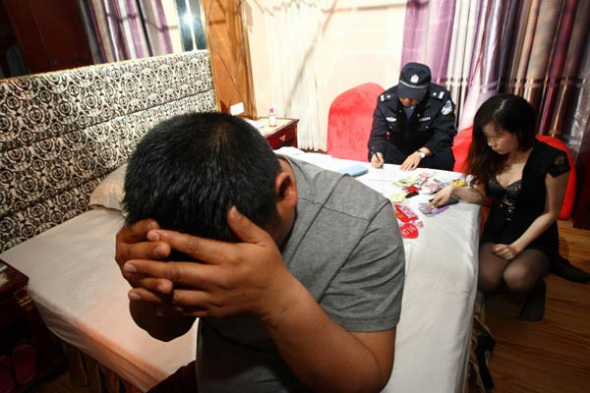


A policeman takes down information from two people caught in a hotel room during the citywide crackdown on prostitution in Dongguan, Guangdong province, on Feb 9, 2014.
BEIJING, Feb. 26 -- In the heart of China's "Sin City", the once-familiar neon sign of three-storey Shengshi Gezhao nightclub is still absent a year into a government crackdown on prostitution.
It was one of many entertainment clubs allegedly involved in the sex trade. As of June last year, 61 establishments had been closed, including 10 that lost their licenses.
By September, only 20 percent had reopened, and the city of Dongguan, China's southern manufacturing hub, had begun phase three of its campaign against prostitution.
The crackdown has exposed sex workers to greater risks, yet many choose to stay in the industry, although they are less visible in the underground venues.
A 28-year-old who gave her name as Xu Li worked at a factory before she swapped her job to become what locals call a"technician".
Since the crackdown, many "technicians" have turned to other work. Xu Li remains in the sex trade for the quick money. "But only for those in the know," she adds. She can earn 20,000 yuan a month, up to six times her salary in the factory.
Xu once considered returning to her hometown in Hubei Province to marry, but she is unwilling to give up her high income and"free" life.
"My boyfriend didn' t know I did this for a living. I'll wait and see - maybe the storm will be over after the Spring Festival," Xu says.
Returning to factory work is out of the question, she insists.
Since the global financial crisis in 2008, manufacturing in the Pearl River Delta city has been withering, driving more young women to the sex trade.
The crackdown on brothels and sex workers has driven a sharp drop in the city' s migrant population.
That's led to many small and medium-sized businesses struggling to meet the demand for higher wages.
"We still need 20 more skilled workers - if only the girls who used to work for us would come back," says a shoe factory boss surnamed Kang. The expansion of the city' s sex trade has long been intertwined with the fortunes of manufacturing.
Yet the implications of the crackdown reach far further.
"We had a terrible time in the hotel business last year. Government officials, business people and even ordinary tourists would rather detour to Shenzhen and Zhuhai than come here," complains Zhong Hanqiang, chief executive of Xin Duhui Hotel.
A hotel owner surnamed Hu had been waiting for guests in his lobby for a week, but the six-storey establishment has been unable to reach 30-percent occupancy since the crackdown.
Hu made this investment 10 years ago when the electronic manufacturing industry was rapidly developing.
"I made a wild guess that the hotel would flourish," says Hu.
Hu guessed right as the sex trade was on the rise at that time and huge investments were made in the hotel and entertainment business after the financial crisis in 2008.
But now some five-star hotels have become karaoke bars and many bars in the local pub street have become restaurants.
After the crackdown, the sex trade seemed to have been eradicated overnight, along with its estimated spending of 50 billion yuan, which had accounted for a seventh of the local GDP.
When the security forces launched the campaign against prostitution in February last year, many experts speculated that Dongguan' s economy would suffer.
But recent forecasts say the decline in GDP is about to reverse, with predictions of 7.6-percent rise this year.
Wan Zhuopei, Party leader of Dongguan' s Houjie County, rejects claims the crackdown is to blame for the fall in hotel business. The main reason, he argues, is the bleak economic environment.
Dongguan Mayor Yuan Baocheng, in his government report to the recent fifth session of Dongguan' s legislature, vowed to eradicate prostitution.
Many representatives attending the session said Dongguan would have to introduce advanced technologies to boost the efficiency of production and become more competitive.
Yuan says Dongguan needs to redirect private capital flows into industrial restructuring and upgrading. Hotel businesses could look at hospitals and nursing homes.
Houjie County is promoting the development of the hotel business through industrial tourism and exhibitions, said Wan.
"It may take a long time to see if these measures work for us. But it may take a longer time to fully eradicate the sex trade," says Hu, the hotel owner. Enditem
 PLA soldiers operating vehicle-mounted guns in drill
PLA soldiers operating vehicle-mounted guns in drill Beauties dancing on the rings
Beauties dancing on the rings Blind carpenter in E China's Jiangxi
Blind carpenter in E China's Jiangxi Top 10 highest-paid sports teams in the world
Top 10 highest-paid sports teams in the world In photos: China's WZ-10 armed helicopters
In photos: China's WZ-10 armed helicopters UFO spotted in several places in China
UFO spotted in several places in China Certificates of land title of Qing Dynasty and Republic of China
Certificates of land title of Qing Dynasty and Republic of China  Cute young Taoist priest in Beijing
Cute young Taoist priest in Beijing New film brings Doraemon's life story to China in 3D
New film brings Doraemon's life story to China in 3D Obama is sowing discontent in S.China Sea
Obama is sowing discontent in S.China Sea Rescuers work through night to reach cruise ship survivors
Rescuers work through night to reach cruise ship survivors Driving through limbo
Driving through limbo Facing down MERS
Facing down MERSDay|Week